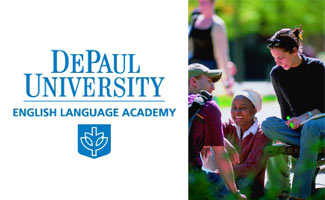
Find an English Language Program (ESL)
It’s true that more international students than ever are fluent in English. But with increasing numbers of international students applying to U.S. universities, many English language programs are evolving to meet the different needs of international students. Some students are coming to the U.S. with advanced English levels and some with only a basic knowledge.
Foundational Programming
The English Language Academy (ELA) at DePaul University in Chicago provides a pre-academic level to students whose English levels are too low to begin the traditional Academic English program. The modified curriculum gives extra support and preparation to students, with an extra lab session each week where students are assisted by trained tutors. Students also meet one-on-one with teachers for additional specialized instruction.
Tutoring
Students, who receive tutoring in reading and writing, soon find themselves tutoring others. Students in the Academy’s highest levels improve their own English skills by tutoring their peers in lower levels of the program.
When the University Bridge Grammar class first made tutoring a requirement, students resisted. But, once students completed the course they discovered that having to teach grammar to other students helped them improve their own skills. Tutoring gave them more confidence and was a fun way to make new friends from other cultures.
DePaul University Writing Center
The ELA works with the university’s writing center, to ensure that peer tutors at DePaul have adequate skills to provide quality tutoring to non-native English speaking students. Tutors are also allowed to serve as conversation partners for ELA students.
The writing center offers activities and events that give students the chance to practice their English outside the classroom. Students can discuss language, writing and culture in the Multilingual Writers’ Forum or read through the latest selection with the book club. Walk & Talk events take students on guided tours of Chicago’s events and attractions. As they explore the city, ELA students from all over the world practice their English with each other in a fun, social atmosphere.
Discipline Specific Course Electives
DePaul also offers specialized English courses that serve the specific needs of a group of international students with high TOEFL-iBT scores, but who still need linguistic support.
An accounting class helps students prepare for professional business culture in the U.S.A. Incoming students in DePaul’s Master’s Program in Accountancy enroll in University Experience–Language and Business Culture. They learn to deliver both formal and informal presentations, business specific expressions and colloquialisms and gain cultural insight about U.S. corporate business culture and office dynamics. Christina Gamiño, who instructs the course, noted, “Accounting is a service profession in today’s world. Smooth communication is just as important as crunching numbers.”
DePaul University Certificate of University Preparedness
ELA offers a certificate that serves in lieu of the TOEFL exam. Dino Pruccoli, Director of International Admissions, says, “We just thought it was time to stop telling students that if they went through all of the hassles necessary to establish themselves in Chicago, they might get in…or not, depending on the TOEFL.” Students who are academically qualified to enter undergraduate programs at DePaul are given conditional admission with a guarantee that if they are successful in their studies at the ELA, they will be admitted.
ELA Club & Activities
On Fridays, an open social club that serves all ELA students, provides social activities. The club takes trips to the Lincoln Park Zoo, the Museum of Science and Industry and the aquarium. Other activities include ice skating, movies and parties.
ELA students curious about American sports can form their own intramural teams. Typical sports that ELA students play are volleyball, soccer, and basketball.
The face and faces of international education continue to change, but the commitment to putting students first remains a constant value in American higher education. The worth of that approach is proven to educators time and again through the comments and success of students.
























